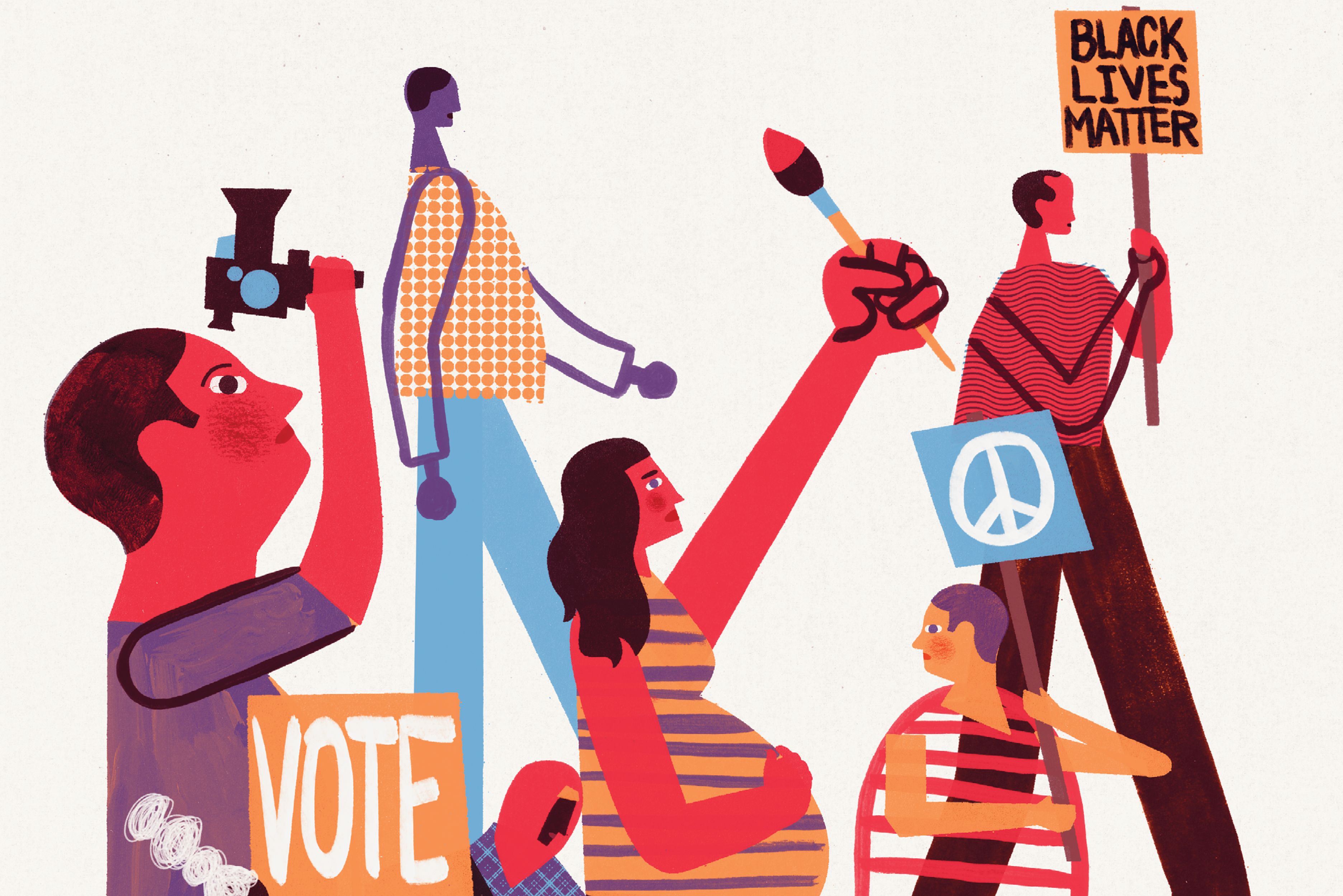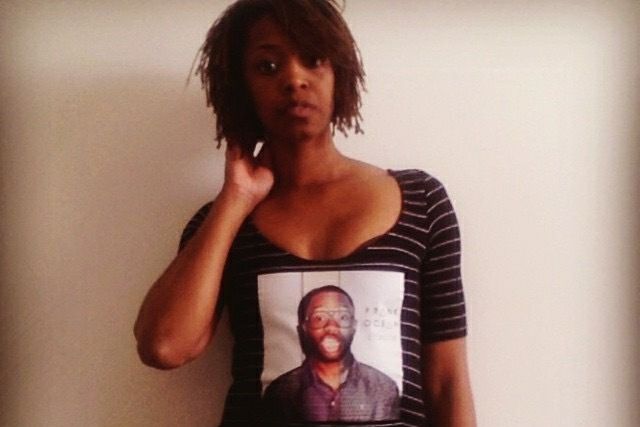
In the Age of Trump, Portland Artists Clap Back
Political Theater
November 8 came just as Artists Repertory Theatre was assembling its next season. The result left the company—whose artistic director, Dámaso Rodríguez, is the son of Cuban immigrants—with some decisions to make. “The anxiety of that moment gave us two choices,” says Rodríguez. “We could become a place for escape, to soothe and distract you from the anxiety you’re in, or a place where we can help people discuss it and respond viscerally to it. And that’s what we decided to do.”
The result is a slate of provocative, politically engaged plays that grapple with racial identity, “alternative facts,” white supremacy, police brutality, and climate change. It’s not without risk for a theater company that usually locks in some seasonal crowd-pleasers as seat sellers to offset less familiar pieces. “We don’t have a classic title, we don’t have a holiday show, we don’t have a comedy that’s just meant to be refreshing and an escape,” Rodríguez says. “Strategically we would design a season with those tent poles in place as a kind of protection against the more challenging programming. This season we don’t do that.”
Season opener An Octoroon, which starts September 3, throws down the gauntlet with a riff on a wildly popular, racist 19th-century play that includes a black character who dons whiteface and redface. “To a certain extent, the racial tension in the city and the hate crimes that we’re seeing make it even more difficult to do this play,” says Rodríguez. “We have to put more energy as a company into making our intentions clear, acknowledging that there’s a racist system that has led to theater audiences being so white—a white supremacist system.”
Rodríguez says this season features “the most diverse lineup of playwrights—therefore characters written, therefore actors cast in the roles—that we’ve ever done.” And while that’s important, says Rodríguez, it’s not enough. “We have to diversify behind the scenes, and we think over time that will impact the audience. But without making those changes from within and resetting our values, we can’t really expect the audience to change. That’s our way forward.”
The Best Words
On the night of Donald Trump’s inauguration, 10 women—among them short story writer Margaret Malone, poet Shayla Lawson, and memoirist Jenny Forrester—came together to read from their work at Southeast’s Ford Food & Drink in an event dubbed Not Our President: Women Writers Against Trump.
“It came from a place of us feeling helpless, and our anxiety as women around Trump being elected,” says poet Chrys Tobey, who, with sister and fellow poet Allison Tobey, organized and hosted the event, inspired by the women’s marches that were planned in protest. “It was really a way for us to process it and try to do something constructive about it.” They packed the house on that first night with more than 150 people, admitted free, with donations collected for Planned Parenthood. The night evolved into a quarterly reading series, with the next installment slated for September 22. The name stayed.
“The reason we have his name in the title is that he takes such issue with being criticized,” Tobey says. “We feel a president should be able to handle criticism.”

Image: Keith Negley
Community Chest
On the wall of illustrator E. B. Harris’s tiny, one-room studio in the backyard of a bungalow in Southeast Portland, there’s an intricate, illustrated portrait of Bernie Sanders. That piece, in a way, became the start of Afterlife Revival, a new “art, music, and social practice project” led by Harris. The Sanders portrait prompted a fundraising event with an art show and music, which led in turn to a business idea with a community focus. Now Afterlife Revival is matching a series of original honky-tonk songs with finely lined art prints for an upcoming show, with a community partner identified for each song to receive 11 percent of the proceeds. The band also plays benefit shows for partners, which thus far have included AntFarm Youth Services and the Pixie Project, with the next planned for the Landmark Saloon in October. “The community focus is the main focus for me,” explains Harris, who says he grew up poor in a conservative Southern Oregon town. “I’m a self-taught artist, and that art kind of saved me.”
Rail Blazers
“She’s gonna make it all the way / 80,000 barrels to Tacoma Bay / Refined, offloaded, shipped and on its way.” So goes the refrain in one of the songs that make up Holcombe Waller’s Notes from the Riverkeepers, a musical and storytelling performance with a visual backdrop centered on the Union Pacific train derailment in Mosier, Oregon, in June 2016.
“Why can these oil trains come through, on these antiquated Civil War–era train tracks, in cars not designed to accommodate their weight or volatility, past towns that have no say, through states that have no say, carrying loads from entities profiting hugely off this transportation who remain anonymous, and protected?” asks Waller, who developed the work during a residency at public-interest nonprofit Columbia Riverkeeper. “It’s almost like a piece of layman’s investigative journalism put into and delivered in song.”
The acclaimed singer-songwriter, whose choral work Requiem Mass was a Time-Based Art Festival hit in 2015, was already at work on a piece about climate change when last fall’s election sharpened his focus. “I felt a compulsion to speak truth around the issue in a way that I felt I could do,” the 42-year-old says, “having one hour of your attention and the ability to sing.”
Waller sees the piece, which he brings on a regional tour this month (September 18–30), as one element of an artistic project he calls Climate Ceremony, and plans more work around environmental issues even as the new administration gets ready to gut the Environmental Protection Agency and attempts to roll back clean energy initiatives. “It’s creating a narrative around climate change that gives people a sense of agency and hope even in the inevitability of it all,” he says. “And with young people, I really think they need that.”
Big Screen, Little Lies
Earlier this year, community media center Open Signal and microbudget film studio Lower Boom put out a call. They were looking for five regional media-makers to create original works on “post-truth,” or “what it’s like to live in a post-factual era.” Says Lower Boom’s Matt Schulte: “Everybody believes nothing and everybody believes everything simultaneously. How could that be? I was looking at it through the lens of the breakdown of language and what words can mean and cannot.”
From the dozens of submissions, the partners chose five, each to receive $1,000 toward the project as well as mentorship and equipment access. Dawn Jones Redstone and Brenan Dwyer were among the winners, for their short film proposal, Nemesis. “It explores white male fragility through the lens of a single Scrabble match,” says Redstone. “What starts out as a competitive word game becomes recognizable gendered political warfare.”
For Redstone, the change in administration has also strengthened her artistic resolve. “As a gay, Latinx filmmaker, the election gave me a bitter determination to focus the lens on the voices that are being silenced and suppressed right now,” she says. “And it’s absolutely important to me to tell these stories with other women and people of color, because if we want our stories told we have to tell them ourselves. We have to become the storytellers.”
Nemesis and the four other post-truth projects can be seen at Open Signal’s Northeast headquarters on November 3.

Image: Keith Negley
From the Pulpit
“Just before the election, one of our staff members who is African American was pulled over by the police in a suburban neighborhood, and told, ‘You don’t belong here,’” says Amanda Stark, executive director of arts venue The Old Church Concert Hall. “The board was shocked by that. In Portland?” Then came the Trump win.
“One of the board members said, ‘You know, we need to have a place to talk about this.’ We came up with ‘The Power of Being Heard.’” That was in April, and comprised a panel of African American women sharing their experiences in what was the Old Church’s first in a series of events called “We Can Listen.” With panels on homelessness and immigration following, the monthly series returns this fall, kicking off with a screening of local filmmaker Melissa Lowry’s Black Girl in Suburbia. “We are in this nice utopic bubble here,” says Stark, who is white. “But when you start talking to people who aren’t white, you realize their experience is not the same as ours, and their voices need to be heard.” That’s where the Old Church, a venue more often associated with classical music concerts and acoustic sets, can help. “What we have with our privilege is this beautiful building, we have this money, we have a sound system, we know how to promote something,” she says. “We have this place, and we want offer the stage to you for you to tell your story.”
The Masked Queen
On stage, one of the city’s best-known drag queens puts a Donald Trump mask on, morphing it through gestures and video manipulations. It’s part of the show Diva Practice, which Pepper Pepper says is both a research project and “a performance about queens dancing in the face of uncertainty.” The Trump section is a relatively new addition. “It’s definitely a heavy-handed statement inside the piece,” Pepper says. “But part of Diva Practice has always been politically conscious and aware of power structures, and it would be ridiculous not to acknowledge the power structure that is the presidency of the United States.”
Pepper says his art is impossible to separate from politics in the current climate. “Being a drag queen performance artist in 2017 is a political act in itself, because I’m a symbol of what that administration is not all about,” he says. “I’m not an immigrant and I’m not a person of color and I’m not disabled, but beyond that I’m a queer radical leftie cross-dressing loudmouth and an artist.”
So what can a show like Diva Practice, an hour-long performance whose current version premieres October 26 at the Headwaters Theatre, do to move the political dial? “It has the power to name and to destabilize the power structure,” Pepper says. “And it has the power to connect people around an idea, to mobilize people.”




